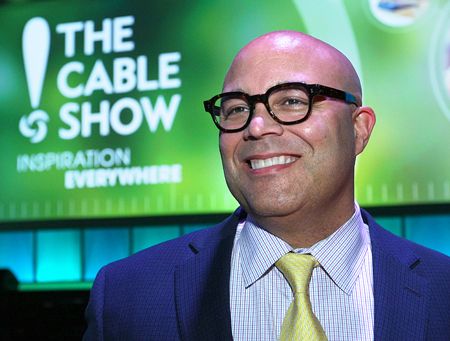Cable Show: Powell: Nets Are Conduit To Better Society
The smarter way to stay on top of the multichannel video marketplace. Sign up below.
You are now subscribed
Your newsletter sign-up was successful

National Cable & Telecommunications Association president Michael Powell told an opening session audience at the Cable Show in Los Angeles. Tuesday that building a better world is all about forging a community of shared values, and that community "requires a network," the "wires, fiber strings, towers, poles, routers and airwaves" that private commercial entities like NCTA's members provide.
Powell lifted his rhetoric to match that lofty goal of creating a path to a better society, comparing the "crisis in public utility infrastructure, with the dynamism and stable investment in broadband Internet services."
"The human voice can only travel 600 feet, but with technology it can now travel the globe at the speed of light, carrying the word of commerce, the learnings of academia, the sadness of a loved one’s passing, and the joy of a baby’s birth," he said.
The FCC is currently considering new network neutrality rules that would not require reclassifying Internet access as a Title II service subject to mandatory access, but will ask as part of its May 15 vote on the rule proposal whether it should consider that Title II move.
Powell suggested that it would be a mistake to think the government can do a better job of running broadband networks, and contrasted the investment cable operators have made in their infrastructure with the "chronic underinvestment" in other infrastructure.
"It is the Internet’s essential nature that fuels a very heated policy debate that the network cannot be left in private hands and should instead be regulated as a public utility, following the example of the interstate highway system, the electric grid and drinking water," he told the crowd. "The intuitive appeal of this argument is understandable, but the potholes visible through your windshield, the shiver you feel in a cold house after a snowstorm knocks out the power, and the water main breaks along your commute should restrain one from embracing the illusory virtues of public utility regulation."
There are an estimated 240,000 water main breaks per year in need of a trillion-dollar fix in the water system, he said, and the "suffering" electric grid is in desperate need of almost that much--"In 2011, there were 307 major blackouts," he said. "Can you imagine if the Internet blacked-out 300 times a year?"One in three roads are in bad shape, he added. Meanwhile, ISP's have invested $1.3 trillion in their networks since 1996 to make them world class and at speeds that have increased 1,500 percent in the last decade.
The smarter way to stay on top of the multichannel video marketplace. Sign up below.
Powell may have been handing out the laurels, but he was not resting on them. "We need to continue to build a faster and open Internet," he said. "We need to continue to produce content that entertains, informs and delights. We need to keep prices reasonable and the value of our services high. We need to deliver second-to-none customer service. And we need to be good corporate citizens."
Powell told Multichannel News before the show that he felt TV programming was now literature. He made that point to his audience Tuesday in suggesting cable programmers had a higher calling than the balance sheet.
"
In our vocation we knit together these two very powerful human forces: network and Ssory. It’s a spectacular combination that too many take for granted. We spend time talking and fighting about regulatory gains and losses. We spend so much energy debating how the spoils of profit are divided. All necessary of course, but there is a higher value in what we do."
"I believe the cable industry can and does make the world a better place. I believe our work is a good business but it also serves a higher purpose.
"We nurture the soil of modern community, and therein lays the hope and opportunity of a better future. We are able stewards of that future. Much is being asked of us and we strive rightfully and earnestly to answer that call."
Contributing editor John Eggerton has been an editor and/or writer on media regulation, legislation and policy for over four decades, including covering the FCC, FTC, Congress, the major media trade associations, and the federal courts. In addition to Multichannel News and Broadcasting + Cable, his work has appeared in Radio World, TV Technology, TV Fax, This Week in Consumer Electronics, Variety and the Encyclopedia Britannica.

